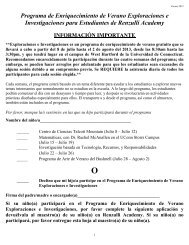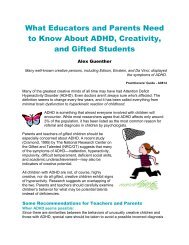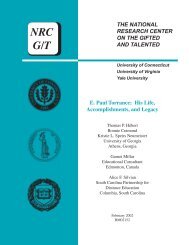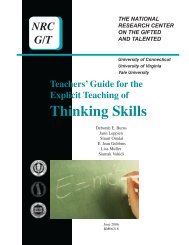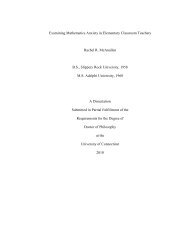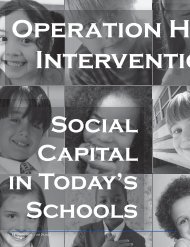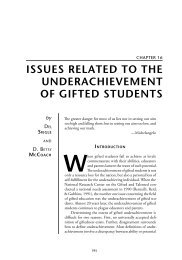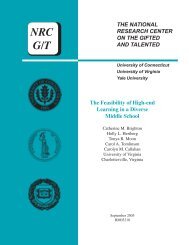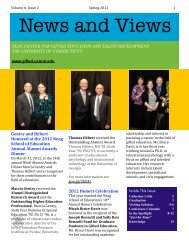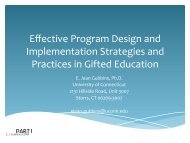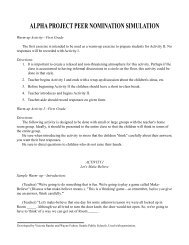Giftedness and High School Dropouts - Neag Center for Gifted ...
Giftedness and High School Dropouts - Neag Center for Gifted ...
Giftedness and High School Dropouts - Neag Center for Gifted ...
Create successful ePaper yourself
Turn your PDF publications into a flip-book with our unique Google optimized e-Paper software.
42<br />
educational support at home. Ekstrom <strong>and</strong> his colleagues reported that (a) dropouts got<br />
fewer educational aids from parents, (b) dropouts' parents had lower educational<br />
expectations, <strong>and</strong> (c) dropouts' parents had less interest in <strong>and</strong> were less likely to monitor<br />
their children's school activities (Ekstrom, Goertz, Pollack, & Rock, 1986). In this study,<br />
it is not clear that the parents of gifted dropouts provided poor educational support to<br />
their children.<br />
The study also shows that parents of gifted dropouts were not actively involved in<br />
their children's decision to drop out of school. Although 75% of parents tried to talk their<br />
children into staying in school, only a small percentage of parents took actions such as<br />
calling the child's teacher or school counselor, offering special tutoring or programs, or<br />
offering transfer to another school. These results imply that parents whose gifted child<br />
who is at risk <strong>for</strong> dropping out of school should communicate closely with teachers,<br />
because parents' educational aspirations <strong>and</strong> their involvement may affect gifted students'<br />
school per<strong>for</strong>mance as well as deportment (Ekstrom et al., 1986). Present study findings<br />
reveal that many gifted students who dropped out of school had very limited experience<br />
with computers <strong>and</strong> spent little time on hobbies.<br />
Reasons <strong>for</strong> Dropping Out of <strong>School</strong><br />
In this study, gifted students who dropped out of school reported a variety of<br />
reasons that caused them to drop out of school (see Figure 12). Many gifted students left<br />
school because they were failing school, did not like school, got a job, or were pregnant,<br />
although there are many other related reasons. Although gifted male students' reasons<br />
were more related to economic factors <strong>and</strong> gifted female students' reasons were more<br />
related to personal factors, school-related reasons such as "I did not like school" or " I am<br />
failing school" were common reasons <strong>for</strong> both groups. These findings are similar to<br />
findings from the previous study from NCES, which included all ability groups.<br />
According to the NCES report (1994b), the reasons <strong>for</strong> leaving school reported by<br />
dropouts were more often school-related than job related or family related. Also, male<br />
dropouts were more likely than female dropouts to report leaving school because of<br />
expulsion <strong>and</strong> suspension. In addition, present study results indicated that students'<br />
educational aspirations were significantly related to the gifted students' dropping out of<br />
school. Some gifted students have low educational aspirations because of personal or<br />
school-related problems. This suggests that teachers <strong>and</strong> parents should guide <strong>and</strong><br />
encourage potential dropouts to increase their educational aspirations. Also, school<br />
culture should be changed to meet the needs of these students, providing an appropriate<br />
curriculum <strong>and</strong> stimulating their interests <strong>and</strong> learning styles (Renzulli, 1986; Robertson,<br />
1991).<br />
It should also be noted that some gifted students dropped out of school because<br />
they failed their courses, even though they were identified as gifted. This finding has an<br />
important implication <strong>for</strong> teachers <strong>and</strong> researchers. In this study, we used a flexible<br />
definition that included a broader range of students identified as gifted. If educators <strong>and</strong><br />
researchers use a very restrictive definition of gifted, some talented young students who<br />
are potential dropouts will be overlooked <strong>and</strong> not provided with appropriate educational




